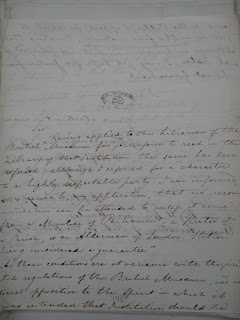admission to the British Library

I've had trouble getting a seat in the British Library this week, and the old canard about who should have access to the library has recently been raised again in the Guardian. The comments below the article remind the reader of the old days when it was much more difficult to get a reader's ticket, and indeed I remember when I first joined I had to provide a list of the manuscripts which I wished to consult there, which could not be accessed elsewhere. So instead I went to the National Archives, and by coincidence came across this letter in a bundle of HO 44 papers marked 'miscellaneous'. HO 44/35, f.198 G. Duncombe Cox, M.D., of Bedford Square, London, wrote a letter of complaint regarding his application for a reader's ticket for the British Library in September 1840. His application had been refused, because the regulations stated that he had to be recommended by 'a Member of Parliament, a Rector of a Parish, or by an Alderman of London', whic...

